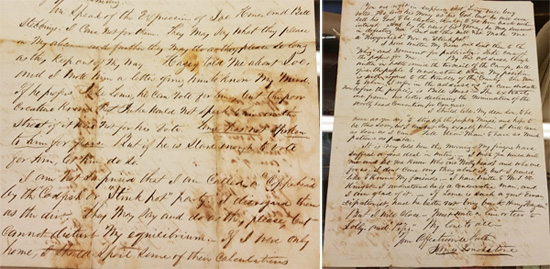
: Google Book Search Library Project, 2008. (Open Collections Program at Harvard University. : Harvard College Library Digital Imaging Group, 2007. Published in 1898, without change of text under title: The cruel side of war.Įlectronic reproduction. United States-History-Civil War, 1861-1865-Hospitals Volunteer workers in medical care-United States-Correspondence A real on-the-battlefield letter with a vivid description of battlefields around Gettysburg and of wounded and.


Wormeley, Katharine Prescott-Correspondence Letters Wormeley wrote while a hospital volunteer caring for wounded soldiers during the peninsular campaign of the Civil War in 1862. “Written by Walt Whitman,” he signed it, “a friend.The other side of war with the Army of the Potomac : letters from the headquarters of the United States Sanitary Commission during the Peninsular Campaign in Virginia in 1862 By the end of the year, Jabo was dead and his wife applied for a pension for herself and her six children. “I hope it shall be God’s will that we shall yet meet again,” wrote Whitman on Jabo’s behalf-words that must have comforted his bereaved wife after Jabo died.

Whitman penned the letter on January 21, 1866. Whitman visited Jabo at the hospital, where he was dying of tuberculosis and asked Whitman to write home. Jabo, a dying infantryman, who could not read or write, even more precious. That makes the letter Whitman wrote on behalf of Robert N. B, 79th Indiana Infantry, and subsequently in the Engineering Corps. 1831) was a Marion County, Indiana farmer who served as a private in Co. Historians know that there are plenty of letters out there penned by Whitman on behalf of soldiers, but they’re not sure how many and finds are rare. Central to the Johnston-Rhoads correspondence is a group of 50 letters exchanged by Charles Ward Johnston and his wife, Sarah Jane Rhoads Johnston, during the Civil War. In 1865, Whitman published " Drum-Taps," a collection of poetry that he wrote in part while sitting by the sides of wounded soldiers in Washington hospitals. His experiences in Civil War hospitals changed him (and his writing) forever. The letters illustrate the details of camp life at Fort Monroe, the Marine Hospital at Key West, Florida, Port Royal, Camp Parole in Annapolis, Maryland, and. He decided to stay in Washington to help soldiers in hospitals, and soon he was entertaining them, getting them supplies and comforts, and helping them write letters home. "Several wanted word sent home to parents, brothers, wives, &c., which I did for them, (by mail the next day from Washington),” he wrote after accompanying wounded soldiers on the journey the Fredericksburg battlefield to hospitals in Washington. After visiting his brother at a field hospital following the Battle of Fredericksburg, Whitman began to spend time in wartime hospitals, assisting wounded soldiers. And it’s not the only letter of its kind. The find was later authenticated by a Whitman expert. Ruane writes that she saw the postscript “Written by Walt Whitman, a friend” on the correspondence, and realized that the letter, dictated by an illiterate soldier at Washington’s Harewood Hospital, was penned by the poet.

Ruane reports, came across a rare letter by Walt Whitman in the National Archives.Ĭatherine Cusack Wilson was doing volunteer work for a digitization project on Civil War widows’ pension files when she ran across the letter. So imagine the glee felt by a volunteer who, as the Washington Post’s Michael E. Processing documents can be a thankless and boring task at times. Rather, it’s processed-identified, cataloged and digitized-by archival staff or, in the case of many institutions, hard-working volunteers willing to put on their white gloves and do some behind-the-scenes grunt work. What happens to an old document when it’s placed in an archive? It sure doesn’t identify and sort itself.


 0 kommentar(er)
0 kommentar(er)
